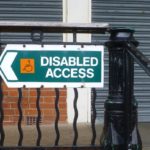How I became Disabled
By Clare Cochrane
“I was like the drinker who didn’t want to admit it. That’s the first step in the AA meeting. I never wanted to admit publicly I’m disabled.” – Niko von Glasow, film director
Well, it’s taken nearly 20 years, but I’ve finally come out as disabled. And it’s the scariest feeling. I’m more nervous about it, feel more shaky and more exposed and vulnerable than I did when I came out as gay 22 years ago.
I applied to go on a two-week permaculture and activism camp, with teachers whose writings have inspired me for years, in the lovely Devon countryside. I mentioned in my application that I have rheumatoid arthritis, regularly experience pain, have limited strength, mobility and stamina made more limited by pain brought on by physical exertion, and need regular rest breaks. My application also talked about my experiences in environmental and anti-nuclear activism, living in a radical housing co-operative, and my paid and unpaid work in facilitation, training and creative community action. When I was offered a place on the course I was so excited! Two weeks studying and creating with other eco-spiritual-activists like me! I was virtually spiraldancing on the spot!
I touched back down to earth briefly to send an email reminding the organisers of my physical limitations and that camping for two weeks is likely to exacerbate these and ask about transport to the site, and space for rest during the fortnight. I found this difficult. Usually I live my life by not making a fuss about my ‘limitations’. I rarely ask others to make adjustments for me, and I never call myself disabled. But I got a lovely reply saying that the nearest bus stop was very near by, and there would be space to rest each day. I went out and treated myself to a new waterproof jacket (I’m optimistic by nature, but not stupid).
Then I got the pre-course information. The bus stop is a 25 minute walk through the countryside from the site, and a sample schedule for each day shows an agenda packed from 7.30am to 9.30pm with breaks only for meals… Yikes. I emailed and asked whether someone could meet me from the bus and take me back at the end of the fortnight, by which time I might be unable to walk much after the physical strain of camping. And I asked whether my need to rest would mean that I miss out on some of the course teaching. A lovely email in reply that yes, someone could meet me from the bus, and that it would be fine to miss some of the workshop time if I need to rest.
Sounds fine, doesn’t it? They’re prepared to make concessions for me – such as missing sessions – so I can handle the schedule. I should be glad, grateful even. But I’m not.
Because ‘access’ is not just about concessions. It is not just about widening the doorway so a wheelchair can get through, or meeting a crip off the bus. It is not about bending the ‘normal’ rules for the people with ‘special needs’. Because that’s patronising. And it’s offensive – when you define the world as ‘normal’ and us as needing help to fit in, you’re defining us as ‘abnormal’. When you ‘help’ us fit your world, you’re giving us charity, not support to fulfil our rights. And when you feel sorry for us because we’re missing out on things because of our impairments then that’s pity.
At the very least access is being prepared to re-arrange a course, a building, a job, a workplace, so that our impairments aren’t ‘special’ difficulties. It’s a very mechanical approach to access, and sees disability in terms of mechanical impairments and difficulties. But it is at least about modifying the world from a basis of understanding that disabled people have the right to take part in mainstream (or ‘non-disabled’ world) activities. This is what the social model of disability is supposed to encourage us all to do, and the Disability Discrimination Act has (amazingly progressively) enshrined this in law.
But a better, and more radical, more exciting, approach, would go much further than this. Real inclusion, for me, would be for all of us to start from scratch and together build a world, build communities, where all people can contribute according to their desires and their capabilities, and all of us joyfully embrace our responsibility to support each other to contribute where and how we want to.
I realised that at this point I had a few options: I could write back to the organisers and say, ‘Thanks, but I don’t think I can manage it after all, and sadly I won’t be able to come.’ I could write back and say, ‘Thanks, I’m sure I’ll manage, I’ll be grateful for your help.’ Or I could write back and say, ‘Thanks, but I still don’t think you really understand. Access is not just about widening doorways, or taking our ‘special needs’ into account. It’s about starting from scratch and together creating a new vision of the world we want to live in (etc etc). I’d be happy to offer a workshop on this during the course.’
The first two options felt a bit like colluding with the (albeit unconscious) agenda of keeping disability out of sight, invisible. So I chose the third option – making my disability really visible, for once, putting disability explicitly on the agenda by making an example of myself. And now I feel really exposed, because this is personal – it’s me, it’s my body. It can’t get more personal than this. And it means that finally I’ve publicly labelled myself disabled.
So that’s it. I’m out. I don’t quite feel proud yet, but hopefully that will come soon. What I actually feel is scared; nervous that people won’t take me seriously; that I’m doing something not very nice by making an example of myself. That having stepped out of the closet and into the spotlight, I’ll find myself all alone and facing a crowd full of hecklers. That I’ll find myself alone. I hope I won’t. I hope I’ll find that standing with me on the stage is everyone who wants to live in a world where the emphasis is on what we each want to do and how we can all support each other to do the things we want to within and for our communities. I hope you’ll be there with me. I hope it’s a big enough stage to hold us all.
This post first appeared at Topsoil.



I thought this was a fantastic, brave piece, and resonated with many of my own experiences. Thanks for that.
Douglas: I don’t think the point is to anticipate every possible disability-related issue that could ever come up. Obviously that’s impossible, because the range of disability presentations is huge. And there are some things that it’s not appropriate to mainstream. However, there are a few basic changes that would make any workshop or event much more accessible, and including rest breaks between events is something that I think event organisers can be reasonably expected to do. I also think event organisers can be reasonably expected to anticipate that not everyone can walk the distance from the bus stop, and alternative arrangements will need to be made, and that these should be offered as default.
I’ve also found in my own experience of organising events that it often helps to dedicate a bit of quiet space as “quiet space” for anyone who needs a few minutes to themselves, to rest, or in case things get to noisy, etc. Another good practice thing I’ve also seen is to have a “kid’s corner” with some games and crafts in case people bring their children, so that parents can participate.
These things aren’t hard to organise, but the awareness has to be there. Being able to get in the door, ues a toilet, or participate in an event shouldn’t be a special thing that you have to ask for — the organisers should assume that people with a range of disabilities and circumstances might attend, and make arrangements accordingly. Chances are, people probably wouldn’t want to walk the 25 minuts from the bus carrying a toddler and their earthly posessions either. Never hurts to think about peopel with a range of circumstances, otherwise you’re really just planning events for wealthy single non-disabled dudes. Which isn’t really a representative sample of the population. So my complaint when people suggest that the social model is being pushed too far is to wonder whether they really thing the population is actually as white, middle class, and male, as many activist workshops/events might lead you to think.
–IP
Hello Douglas,
I see your point, very clearly. I don’t have a prescription for how this event could have been better organised, nor do I have a prescription for how ALL events SHOULD look. It would be better if, when events are being organised, the organising group includes people who have a disabled person’s perspective. Then I think we’d avoid a lot of awkward ‘problems’ raised by disabled people, but more than that, but more positively, disabled people would have the assurance that when they request or state a need for a particular adaptation, they’d know they were doing so in a context of being expected to state their needs, rather than having to overcome anxiety that they were raising problems…
What this article is saying is that we haven’t yet gone far enough in the sense that we still ‘problematise’ disability, by seeing it as making concessions to the non-normative, rather than understanding that the world is a big place with plenty of room for diverse needs. That’s the attitude change that needs to come about. Then disabled people won’t have to ‘come out’ and try to be ‘proud’ – these are the result of fighting against the prevailing discourse and social attitudes that see us as less than normal.
You can’t expect people who don’t experience a problem to see that there is a problem. This is what ‘unconscious privilege’ is about. This is a great article on it: https://sindeloke.wordpress.com/2010/01/13/37/
“But a better, and more radical, more exciting, approach, would go much further than this. Real inclusion, for me, would be for all of us to start from scratch and together build a world, build communities, where all people can contribute according to their desires and their capabilities, and all of us joyfully embrace our responsibility to support each other to contribute where and how we want to.”
Whilst I dont see a problem with this as an idea I am a little confused in how it can be implemented. If those with the capability and desire want to attend an event that runs for 10 hours a day with little scope for rest in between should they not be able to do so? (although how they can manage to do that for the 2 full weeks I am unclear).
In your ideal world, how would the event have been organised? What could be done with in the time that you need to rest and recuperate that you would not feel disappointed to miss out on?
Surely the social model of disability can only be extended so far? There has to come a point where no amount of changes in attitudes or support from others can change the fact that a person who has a disability may not be able to do everything that a person without that disability.
Although I have to say that a 25min walk is not a nearby bus stop.
thx